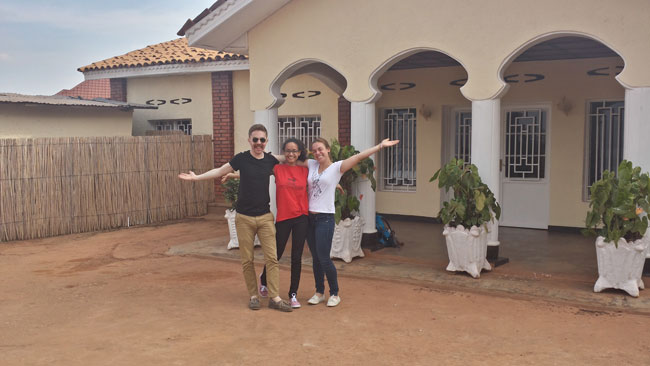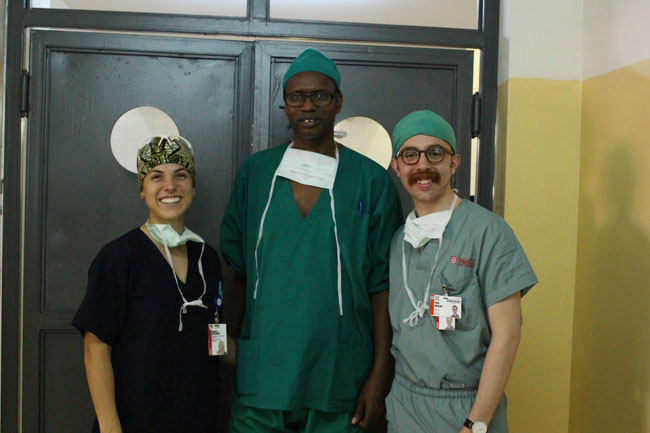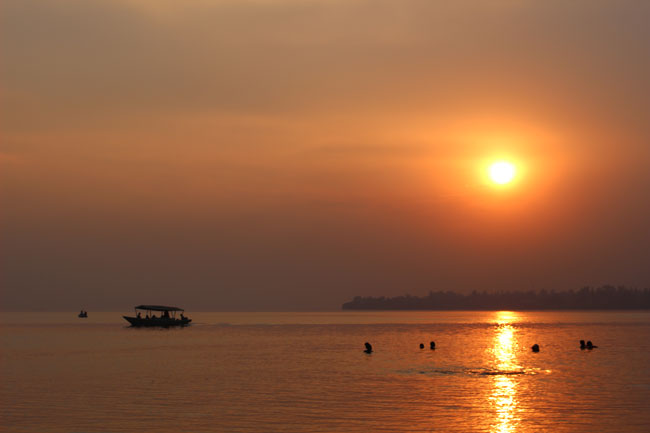
By Ryan Adessky and Annie Lalande
Over a six-week period in the summer of 2015, three McGill medical students participated in a bilateral exchange program with the University of Rwanda. The exchange involved a rotation in acute care surgery, training at the Arnold and Blema Steinberg Medical Simulation Centre, a dissection program in the McGill anatomy lab and a research project, split between three weeks in Montreal, and three weeks in Kigali.
—
The hills of the “Pays des Milles Collines” have a mischievous kind of beauty. With each peak, a view over the magnificent landscape of this tiny landlocked country. With each bend in the road, a flashback to the bus I saw earlier, sprawled on its side after entering the curve too fast.
It’s the last evening bus out of Butare, in the south of Rwanda. The women on my left are giggling as they realize that the bus has left without my friends, who were waiting to use the washroom before the two-hour ride.
—

The project started when a group of Rwandan medical students at the University of Rwanda approached their dean with the hope of growing their surgical student society by partnering with another school.
With the Dean’s help, the students were put in touch with Dr. Dan Deckelbaum and Dr. Tarek Razek, McGill trauma surgeons and co-directors of the Centre for Global Surgery. For five years, the Centre for Global Surgery has been collaborating with the Centre Hospitalier Universitaire Kigali (CHUK) on projects aiming to train Rwandan surgeons. Working for months on end, a group of McGill medical students paired with the Rwandan students to create a global surgery exchange project for students interested in surgical careers.
Before long, we were welcoming Phillippe, Hubert and Kelly to the Montreal General Hospital.
—
They arrive in Montreal on a cold and rainy evening, and we head to the Jazz Festival. Montreal is interesting, they tell us, but the weather is awful. Is there any more succinct way of expressing what most Montrealers think of their city?
We are hosting the three students in our homes, giving everyone an opportunity to exchange and learn about each other’s culture and interests. During the week, we rotate between the simulation center at McGill, learning core surgical skills, surgical anatomy workshops in the lab, and time with the trauma team at the Montreal General Hospital. At night, we begin planning a research project to be undertaken in Kigali.
Weekends. To one of the students’ cottage for a weekend, to Ottawa for Canada Day, to La Ronde; it is special to share our home life with the visiting students. They tell us that they are trying to adapt to the new setting as best as they can. We’ll soon understand this challenge ourselves.
—
Adjustment. There is something special about learning the quirks and customs of a new place.
We like to complain about the STM not following its schedule. In Kigali, the bus follows a pretty simple rule: the bus leaves when the driver is satisfied with the number of passengers on board (usually, 3 more than maximum capacity). And if the bus driver feels that the bus does not have enough customers, he’ll get everyone to leave the bus, U-turn, and restart his route in the other direction. That’s alright, there’s a breeze and a nice view on the walk home.
—

“Kira!” Dr. Antoine exclaims. It’s a stand-in for “bless you,” as I sneezed, but translates more literally into “get better – and that’s an order.” It’s pretty impressive to see a surgeon repair the severely damaged intestines of a patient with advanced typhoid infection while simultaneously instructing the students and residents, and making musical requests to the circulating nurse in the OR.
Yet, it’s par for the course for a man who left a successful career in Europe to work back home in Bujumbura. Born in Burundi, he moved to France to complete his residency in general surgery and embark on a surgical career. After five years of working as an attending surgeon in France, he returned home to practice. Now, with the increasing outbreaks of violence surrounding the electoral campaign in Burundi, he finds himself temporarily operating and teaching in neighboring Rwanda. He’ll remain here until the political situation stabilizes and working conditions became safer in the Burundian capital.
—
Living in a city where we don’t understand the language is challenging, and draining. A few useful sentences in broken Kinyarwanda, and a mixture of French and English and most of the time, we manage to get by. Medical training is in English or French, so we have no issues communicating in the hospital.
—-
Staring. In Montreal, making eye contact with someone who’s staring at you inevitably triggers a reflex to pretend they were scanning the room. Here, not so much. Phillipe is laughing at our confusion. “It’s normal. Here, if people are curious, they will look for as long as they like. It’s not rude!” As the days go by, we’re getting more accustomed to this.
We still get a pretty good laugh when a group of school children break away from their group and chase after Ryan, while yelling excitedly “Mustacha, mustacha!!” and requesting pictures one at a time. 5 minutes of fame: over and gone.
—
It’s a quarter to six, and another day starts. Our kitchen table faces the front windows of the house, and each morning we watch the sky turn red with the sunrise.
Morning conference begins. The residents who covered the surgical service the previous night are grilled by the attending surgeons on their approach to the emergency operations performed overnight.
It is an exercise in humility.
Yet, with each morning conference comes a demonstration of the resourcefulness and dedication of the hospital’s residents and surgeons.
—
The day is moving along well. All six operating rooms are running smoothly. One of us is scrubbed in with Dr. Antoine for a thyroidectomy, another is scrubbed in with the senior resident, who is performing a large skin graft on a child involved in a motor vehicle collision.
As the end of the day approaches, everything slowly comes to a halt. The next patient, due to be transported from the intensive care unit, has not yet arrived. We’re told the transport ventilator equipment isn’t working. When the patient arrives, the operation must wait again, as there are not enough anesthesia staff to cover the operating room. Finally, we wait just a few minutes more, as the hospital does not have running water today, and the water tanks used to scrub in for surgery are empty.
It’s times like these when we appreciate that in order to have a meaningful impact on the provision of healthcare, the training of a qualified workforce must be matched by development of infrastructure.
—
Before we know it, it’s time to head home.
We’ll be back.
Born and raised in Montreal, Ryan Adessky is a member of the McGill Medicine Class of 2017. His academic interests include surgical anatomy education and global surgery. In his free time, Ryan plays guitar in a jazz band, and combs his moustache – a tribute to Sir William Osler himself.
Annie Lalande has completed her third year of medical school, and is currently fulfilling her passion for traveling, going around the globe while starting a Masters in Experimental Surgery. She enjoys surfing, kitesurfing, skiing and playing guitalele whenever she has the time.

